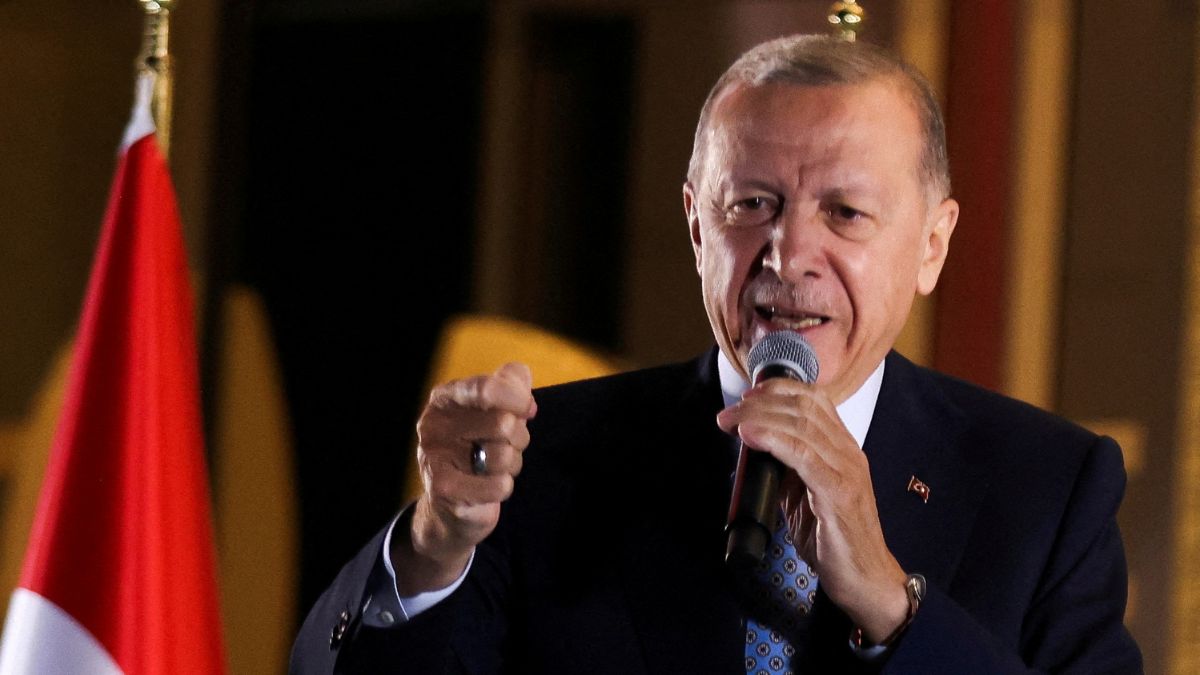From a nation whose minister was sanctioned by the US a few years ago to becoming the broker and host of the biggest US-Russia prisoner swap in the post-Soviet era, Turkey has come a long way in mediating between two adversarial sides read more
)
Turkish President Recep Tayyip Erdogan
Turkey calls it “intelligence diplomacy”. US President Joe Biden feels grateful to his Turkish counterpart Recep Tayyip Erdogan for helping him score diplomatic victories. Latest in the series — that began soon after Russia invaded Ukraine in 2022 — is the exchange of 24 prisoners in Turkey on Thursday-Friday night.
This is the biggest prisoner swap deal between the US and Russia since the collapse of the Soviet Union in 1990. It involved seven countries. The West released eight prisoners in exchange for 16 by Russia.
With this, Turkey has cemented its role as a key mediator between Russia and Western nations. The latest swap that took place at Ankara airport shows Turkey’s evolving pivotal position in cross-Atlantic diplomacy. It also underscores Turkey’s strategic geopolitical role and its ability to maintain relations with both Russia and the West amid escalating global tensions.
Why this is remarkable
In 2018, the US sanctioned Turkey’s two ministers — holding interior and justice portfolios — accusing them of the “unjust detention” of an American evangelical pastor Andrew Brunson. However, it delisted them after his release.
The distrust, however, did not go away. Biden specifically excluded Turkey from the US’s 2021 Summit for Democracy, and said that the Erdogan government’s relationship with his administration would depend on freedoms it extended at home.
But by the next year, Turkey was mediating between the US, Ukraine, and Moscow. Biden praised Erdogan at a Nato summit telling him, “I mean, you’re doing a great job.”
The near about-turn in the US-Turkey relationship happened in 2022, when Russian and American intelligence officials discussed a prisoner exchange. They explored their options of which country could host the prisoner trade as the dynamics had changed after Russia invaded Ukraine in February 2022. Many countries had responded with travel restrictions on Russian officials and sanctions were flowing in every week. Ultimately, the two sides agreed that they could trust Turkey — “intelligence diplomacy” under Fidan.
The evolution of Turkey, the host and the mediator
The April 2022 exchange deal saw the release of former US Marine Trevor Reed, convicted of assaulting a Russian police officer. He was swapped for Konstantin Yaroshenko, a Russian pilot imprisoned in the US for drug trafficking. This was mediated by Turkey and the swap happened in Ankara, its capital.
The September 2022 exchange deal saw five Ukrainian commanders released by Russia for pro-Russia Ukrainian politician Viktor Medvedchuk and additional Russian and Ukrainian soldiers. The prisoners were swapped at different locations in Turkey, Poland and Saudi Arabia, which has also emerged as a mediating partner of Ankara.
Another 2022 exchange happened, with the UAE as the lead mediator and Turkey in the helping role. American basketball star Brittney Griner and Russian arms dealer Viktor Bout were swapped in the UAE.
The September 2023 exchange deal happened, with Qatar playing the lead role with Turkey staying in the backroom. Five jailed Americans were swapped for several Iranian prisoners and access to $6 billion in frozen oil revenue. The swap happened in Qatar.
Pragmatism: The Turkish brand of diplomacy
Turkey’s ability to broker and host these exchanges showcases its unique diplomatic position, maintaining relations with both the US and Russia despite ongoing conflicts. Erdoğan has adeptly balanced Turkey’s foreign policy, leveraging its strategic location and political influence to facilitate dialogue and negotiations.
The presence of Turkish security officials overseeing the exchange at Ankara airport signifies the pragmatic trust both sides place in Turkey, whose Erdogan hopes to position his country as a central player in global affairs.
The White House hailed the exchange as a “feat of diplomacy,” with President Biden personally thanking the involved nations for their cooperation. The release of these prisoners, many of whom faced “show trials” and long sentences, was seen as a victory for justice and human rights.
UK Foreign Secretary David Lammy too has welcomed the releases, particularly of British nationals, emphasising the importance of international cooperation. German Chancellor Olaf Scholz echoed this sentiment, highlighting the humanitarian aspect of the swap and the relief of the freed prisoners.
In Moscow, President Vladimir Putin personally welcomed the returning Russians, demonstrating the domestic political importance of such exchanges. The involvement of high-profile figures like Vadim Krasikov underscores the value Russia places on retrieving its nationals from foreign custody.
So, is Ankara the new Zurich?
The recent prisoner exchange marks a significant moment in Russia-West relations, with Turkey at the centre of this diplomatic achievement. For long after the Second World War, Zurich (Switzerland) and Vienna (Austria) functioned as the chief mediators for cross-Atlantic nations. They were called the Bridge of Spies connecting East and West Berlin once served as the prime venues for spy swaps and hostage deals.
But now the role that Zurich and Vienna played for decades has shifted decidedly eastward.
Russia has added Switzerland and Austria, historically neutral states, to its “Unfriendly Countries List” after they followed the West in sanctioning Russia following its invasion of Ukraine. Swiss diplomats, who once played a pivotal role in mediating superpower conflicts during the 20th century, are no longer trusted by the Kremlin.
In contrast, Turkey — a NATO member that still supplies military-linked goods to Russia while selling combat drones to Ukraine (reportedly developed by Erdoğan’s son-in-law’s firm) — has emerged as the key backhand negotiator of deals between the two sides.

 1 month ago
9
1 month ago
9
)
)
)
)
)
)
)
)
)
)
)
)
)
)
)
)
)
)
)
)
)
)
)
)
)
 English (US) ·
English (US) ·